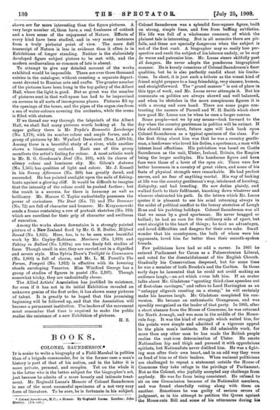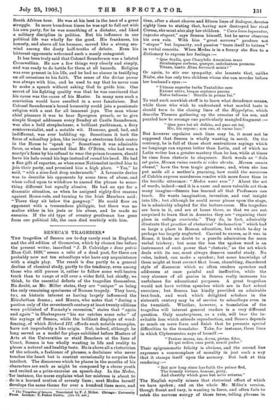BOOKS.
COLONEL SAUNDERSON.* .
IT is easier to write a biography of a Field-Marshal in politics than of a brigade commander, for in 'the 'former case a man's history is part of that of his nation, and in the latter it is mOre private, personal, and complex. Yet on the whole it is the latter who is the better subject for the biographer's art, just because be admits of a more homely and intimate treat- ment. Mr. Reginald Lucas's Memoir of Colonel Saunderson is one of the most successful specimens of a not very easy form of literature. To be sure, he is fortunate in his subject.
• Colonel Saw:lair:0:4 M.P.: a Memoir. By Reginald Lucas. London : John Murray. [Us. Let.] Colonel Saunderson was a splendid four-square figure, built on strong, simple lines, and free from ha ing subtleties. His life was full of a wholesome romance; of which the Plainest tale is interesting. But in all memoirs there are pit- falls, and these are specially dangerous when the subject is not of the first rank. A biographer may so easily lose per- spective and exalt the subject of his labours unduly, or he may Jo worse and patronise him. Mr. Lucas steers skilfully past all dangers. He never adopts the ponderous biographical manner. He is keenly conscious of Colonel Saunderson's finer qualities, but he is also perfectly candid about his limita- tions. In short, it is just such a tribute as the wisest kind of friend might prepare to a long friendship, very sincere, human, and straightforward. The "grand manner" is out of place in this type of work, and Mr. Lucas never attempts it. But his comments on politics are always shrewd and well balanced, and when he sketches in the more conspicuous figures it is with a strong and sure hand. There are some- pages con- trasting the careers of Parnell and W. H. Smith which show how good Mr. Lucas can be when he uses a larger canvas.
Some people—not we by any means—look forward to the day when the country gentleman in politics will be extinct. If this should come about, future ages will look back upon Colonel Saundez.son as a typical specimen of the class. For the first thing about him was that he was a country gentle- man, a landowner who loved his duties, a sportsman, a man with intense local affections. His patriotism was based on Castle Saunderson as the unit, Ulster, Ireland, Britain, the Empire being the larger multiples. His handsome figure and keen face were those of a lover of the open air. There were few better horsemen in a country of great riders, and some of his feats of physical strength were remarkable. He had perfect nerves, and no fear of anything mortal.. His way of looking at life was, the country gentleman's way, intolerant of humbug, disloyalty, and bad breeding. He saw duties plainly, and walked forth to their fulfilment, knocking down whatever and whoever obstructed his path. In the letters which Mr. Lucas quotes it is pleasant to see his mind returning always in the midst of political conflict to the breezy stretches of Lough Erne and his yachting holidays. Colonel Saunderson was all that we mean by a good sportsman. He never bragged or bullied; be had no care for the millinery aide of sport, but went straight to the heart of things ; he took no advantages, and loved difficulties and dangers for their own sake. Small wonder that his countrymen, the bulk of whom were his opponents, loved him far better than their smooth-spoken friends.
Few politicians have had so odd a career. In 1865 he entered Parliament for Cavan as a Palmerstonian Liberal, and voted for the disestablishment of the English Church. Gradually his Conservatism deepened, but for some time he was a member of both Brooks's and the Carlton. In those early days he lamented that he could not avoid making an audience laugh,—an art which raver left him. If an orator talks about Mr. Gladstone "spouting third-class speeches out of first-class carriages," and refers to Lord FIartington as an "unhappy oligarch roosting on a stump," he will certainly make his hearers laugh. Mr. Gladstone completed his con- version. He became an enthusiastic Orangeman, and was speedily recognised as the leader of that party. In 1885, after a short absence from the House of Commons, he was returned for North Armagh, and was soon in the middle of the Home- rule fray. It was the kind of struggle which suited him, for the points.were simple and admitted of a vigorous appeal to the plain man's instincts. He did admirable work, for more than any other man be has made the British people realise the cast-iron determination of Ulster. He smote Nationalism hip and thigh and pursued it with opprobrious epithets, but Nationalists never disliked him. He was a fight- ing man after their own heart, and in an odd way they were as fond of him as of their leaders. When eminent politicians are challenged to repeat a statement outside the House of Commons they take refuge in the privilege of Parliament. Not so the Colonel, who joyfully accepted any challenge from anybody. He was far from being. consistent. He refused to sit on one Commission because of its Nationalist members, and was found cheerfully voting along with them on another. Sometimes he was guilty of serious errors of judgment, as in his attempt to petition the Queen against the Home-rule Bill and some of his utterances during his
South African tour. He was at his best in the, heat of a great struggle. In more humdrum times he was apt to fall opt with his own party, for be was something of a :dictator,. and liked a military discipline in politics. But his influence in our political life was wholly for the good. His frankness, his honesty, and above all his humour, moved like a. strong sea- wind among the dusty half-truths of debate. . Even his bitterest opponents welcomed such a manly antagonist.
It has been truly said that Colonel SaundersOn was a belated Cromwellian. He saw a few things very clearly and simply, and was ready to do battle for them at all hazards. Religion was ever present in his life, and he had no shame in testifying on all occasions to his faith. The sense of the divine power was always with him, and he used to say that he never rose to make a speech without asking God to guide him. One secret of his fighting quality was that he was convinced that his cause was the cause of his Master. In many men such a conviction would have resulted in a sour fanaticism. But Colonel Saunderson's broad humanity could join a passionate religion with a zest for all innocent joys. The man whose chief pleasure it was to hear Spurgeon preach, or to give simple Gospel addresses every Sunday at Castle Sa.underson, was also a bold steeplechaser, a brilliant yachtsman, a fiery controversialist, and a notable wit. Humour, good, bad, and indifferent, was ever bubbling up. Sometimes it took the form of schoolboy jokes, like inviting a stentorian Irish orator in the House to "speak up." Sometimes it was admirable farce, as when he asserted that Mr. O'Brien, who had won a martyr's fame by his refusal to wear the prison trousers, should have his halo round his legs instead of round his head. He had a fine gift of repartee, as when some Nationalist invited him to join their party, and promised hint a high place. "Yes," he said, "with a nine-foot drop underneath." A favourite device was to describe his opponents by some term of abuse, and when called upon to withdraw to amend the phrase to some- thing different but equally abusive. He had an eye for a dramatic situation, as when he assigned eighty-five reasons against Home-rule, and turning to the Irish Members said : "There they sit below the gangway." He could floor an opponent with a tremendous philippic, but there was no malice either in his jests or his abuse, and he made no enemies. If the old type of country gentleman has gone from our political life, the race died worthily with him.







































 Previous page
Previous page